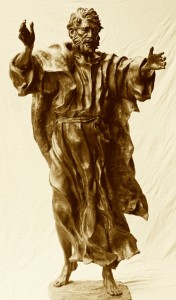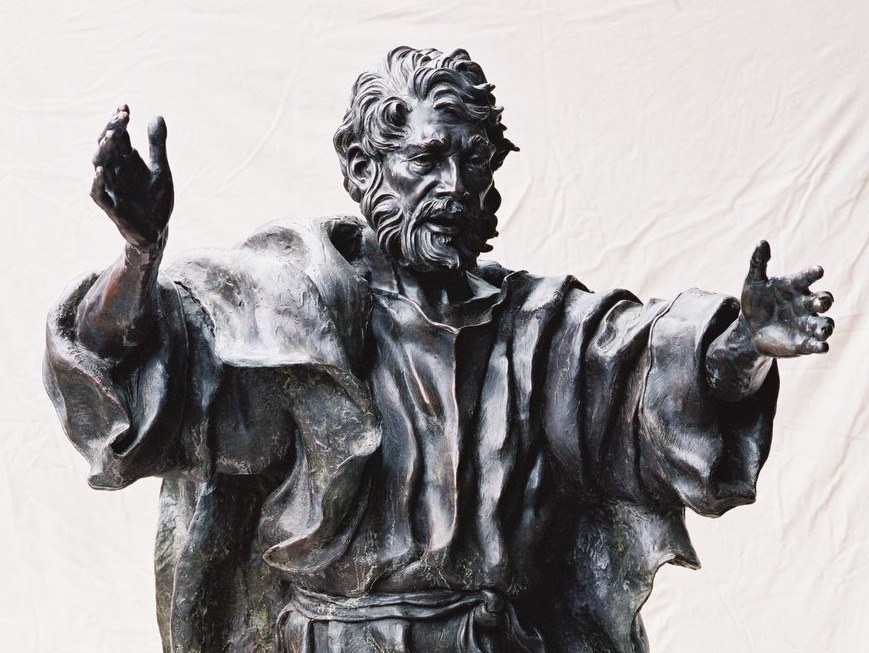There’s no end, it seems, to how people can interpret the words of Jesus. It’s not hard to pluck out a line here and there and read it in some strange new way. How can we know how they actually sounded to his original audience?
 I’ve discovered that a great place to look for answers is in the book of Acts. The people there were first-century believers who heard Jesus firsthand. No time had elapsed for his words to be reinterpreted, and his first followers were passionate for living them out. It’s not unreasonable to conclude that what the early believers did (or at least tried to do) was what Jesus taught.
I’ve discovered that a great place to look for answers is in the book of Acts. The people there were first-century believers who heard Jesus firsthand. No time had elapsed for his words to be reinterpreted, and his first followers were passionate for living them out. It’s not unreasonable to conclude that what the early believers did (or at least tried to do) was what Jesus taught.
This occurred to me as I grappled with some arguments people have raised against studying Jesus in his Jewish context when I wrote Walking in the Dust of Rabbi Jesus. I quoted a popular radio pastor who said:
When Jesus came, everything changed, everything changed.… He didn’t just want to clean up the people’s attitudes as they gave their sacrifices, He obliterated the sacrificial system because He brought an end to Judaism with all its ceremonies, all its rituals, all its sacrifices, all of its external trappings, the Temple, the Holy of Holies, all of it. (1)
This pastor was sharing an unfortunate but common idea among Christians — that Jesus came to bring an end to Jewish practice. In all the ways I could have responded, the best answer came from looking at the book of Acts. This is what I wrote:
If this was what Jesus taught, his first passionate followers in Acts certainly didn’t catch his drift. Peter and the other early Christians continued to participate daily in Temple worship (Acts 3:1, 21:23-26). Jesus did, of course, speak against corruption within the priesthood and prophesy the Temple’s destruction forty years later. Other Jewish groups, like the Essenes, also denounced its corruption and sought to purify their worship. But while the Essenes abandoned the Temple, Jesus’ disciples never did, implying that Jesus did not preach against the Temple’s ceremonies. And even though the Jerusalem church ruled that Gentiles did not need to observe Jewish law, Jewish believers in Jesus continued to carefully observe the Torah, and were even known for their avid observance. (Acts 21:20, 25).
This pastor’s reading of Jesus simply makes no sense with what happens afterward, in Acts. If he was right, you would have expected his followers to jump for joy at being free from the sacrificial system and immediately abandon the Temple. Instead we see them using its courts as their main meeting place, and even asking Paul to sponsor a sacrifice in order to show his commitment to living according to the law (Acts 21:24).
My Laboratory: The Book of Acts
You might remember that my training is in scientific research. I think I’ve discovered a new “laboratory” in the book of Acts where I can look at how Jesus’ original listeners heard his words. It came in handy in an entirely different context when I read this line from a letter to the editor in my local paper:
“Just remember your Christ was not Christian, he was a Hebrew and I bet if he were here today, he would tell you Christians to stop proselytizing against his own people or to others.”
This comment came from a Conservative rabbi who was disgusted with Christians for trying to witness to him. While I sympathize with his irritation at feeling targeted, it’s another thing to make a statement about what Jesus taught about evangelism.
 Once again, let’s look in the book of Acts. At Pentecost, the first thing Peter does after being filled with the Spirit is to preach to a large crowd in the Temple, and three thousand people came to faith. Later, believers go out to cities in Judea and Samaria to share the news. And of course Paul travels far and wide to take the gospel to the Gentiles.
Once again, let’s look in the book of Acts. At Pentecost, the first thing Peter does after being filled with the Spirit is to preach to a large crowd in the Temple, and three thousand people came to faith. Later, believers go out to cities in Judea and Samaria to share the news. And of course Paul travels far and wide to take the gospel to the Gentiles.
If you’re looking for evidence that sharing the gospel was not a priority to Jesus or his followers, you simply won’t find it in Acts. Jesus’ command to “make disciples of all nations” was of major importance to them. And they witnessed both to Jews and Gentiles, from Judea to the ends of the earth. The whole book of Acts (and rest of the New Testament) is the story of the explosive growth of the church.
I agree with the rabbi that Christians can be obnoxious and manipulative in their evangelism efforts. But Christians also can’t ignore Christ’s words and rewrite their theology with their own ideas of “what sounds more loving.” We can ask how we can be more mature and Christlike in evangelism, but we can’t abandon the Great Commission altogether.
The logic that the rabbi uses is something I’ve heard often recently. It usually takes a form something like this:
1) People are offensive when they say ____.
2) But Jesus was love.
3) Therefore, he must not have said it.
The problem with this premise is that Jesus is a historical figure, not an abstraction. “Jesus is Love” is a nice title for a children’s song, but it’s not a basis for theology. The biblical text must be the source and ground for our understanding of him, not our own gut reactions. If Jesus seems to be saying something obnoxious, could it be that it’s our own worldview that needs re-examining?
Acts Challenges Many Ideas
The interesting thing about Acts is that it challenges ideas on both the “right” and “left” sides of Christianity. Here’s another hypothesis we can test. What would Jesus say about the “social gospel” movement today? Many churches are focusing more on meeting physical needs. Others feel that preaching to the lost should be our only mission. Is it just “do-gooder”-ism to run soup kitchens and homeless shelters?
Once again, look at what happens in Acts. There we find that the early church is highly involved in charity and taking care of widows. They are selling their possessions and giving to the poor, something that Jesus often preached about. Paul also says in Galatians 2:10 that helping the needy was what he was especially eager to do. Clearly, caring for the poor was a major emphasis of Jesus’ message, and the early church was passionate about carrying it out.
Again, New Testament history can shed light on a theological debate. Instead of postulating what Christ “might have said” about an issue, we can see what his followers heard him say, and how they responded to it. Certainly the broad sweep of Scripture is better grounding for our ideas than our own speculative theologizing. Often I find that it challenges my preconceptions and refines my understanding of our calling as his disciples.
~~~~~
(1) From a sermon by John MacArthur on the program Grace to You, “Understanding the Sabbath,” given September 20, 2009. (You can find this discussion in my book Walking in the Dust of Rabbi Jesus, on page 23.)
given September 20, 2009. (You can find this discussion in my book Walking in the Dust of Rabbi Jesus, on page 23.)

Norm says
What happened to all the posts that were left in response to this article?
Lois Tverberg says
There seems to have been a glitch in the website that caused a bunch of recent comments to be deleted. My apologies. LT
Pete Rambo says
Thanks for an excellent article. I have a couple of your books.
I have a question (with a wink…). You said, “And even though the Jerusalem church ruled that Gentiles did not need to observe Jewish law” but the Acts test says in 15:21,
“For Moses from ancient generations has in every city those who preach him, since [a]he is read in the synagogues every Sabbath.”… The Jerusalem Council’s clear expectation is that the new believers would be instructed in Torah, in the synagogue, on the Sabbath…. 😉
Thanks again for an excellent post.
Lois Tverberg says
Pete and George, good point, but I would say that you still need to look at Acts and the NT for what they meant by “preaching Moses in the synagogue” implied to them – whether it meant that they hoped, ultimately, that the Gentiles would convert and become Torah-observant Jews.
I would agree that the reason that Acts 15:21 says this was because the Gentiles were being taught godly conduct and what was wrong with their pagan lifestyle. But I don’t see anywhere in the NT where anyone later preaches, “Gentiles, now you realize you need to become Jews, because this is the true reason Jesus came.” Instead, Paul argues the opposite, and one of his strongest reasons was because God decided to pour out his Spirit on the Gentiles when they first believed, not after they were circumcised. That was the big bombshell of Peter’s visit to Cornelius in Acts 10 — that dirty Gentiles could be acceptable in God’s sight, and that he would expand his kingdom to include them as they were, not once they had committed themselves to Israel’s covenant and become Jewish.
George Dorr says
Very true Pete Rambo. Christ followers tend to miss that point.
Mary says
Somehow I missed this post last fall, and am really glad to see it now. (Funny thing, I was just this morning rereading part of Walking in the Dust, in the part with the quote by John Mac Arthur!) I recall Dwight Pryor’s saying in the past that Gentiles no longer needed to become proselytes to Judaism in order to come to the Lord. Do you have information on when and why
the early believers stopped meeting in synagogues?
Jerry H says
You have to go beyond Acts into history of Roman Papacy, how the first thru sixth century persucution deterred synagogue worship as the Sabbath was abolished and ‘Lords Day’ was proclaimed as Sunday by the Emporer. Early Judeo-Christian synagogue worship was forbid, but few went ‘underground’ secretly.
Read Roman / Jewish history for insights to Acts.